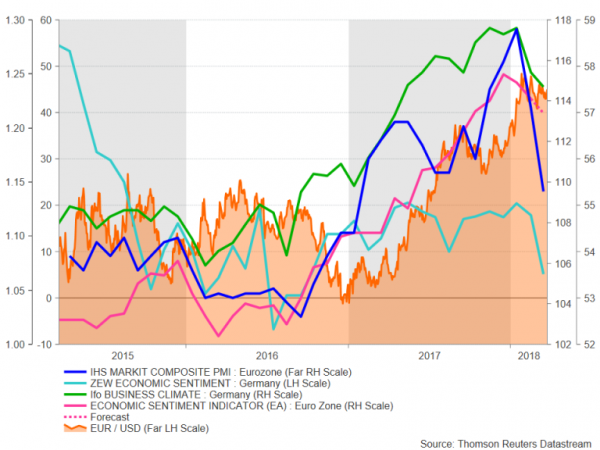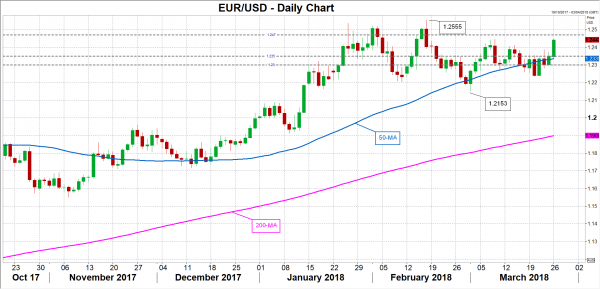As the euro races past the $1.24 level again, recent data out of the Eurozone does not appear to support this renewed bullishness for the single currency. Business confidence gauges for the region are all pointing to a softening in economic activity during the first quarter of 2018, with the March data, in particular, showing a notable slowdown. The European Commission’s economic sentiment index due on Tuesday will be the last of the major surveys for March and will likely join the others in dipping downwards.
The economic sentiment index is expected to decline from 114.1 in February to 113.4 in March, which would make it a six-month low. It’s sub-components, the business climate, industrial sentiment and services sentiment indices are also forecast for a fall in March. Only the consumer confidence measure is not expected to decline and instead to remain unchanged at February’s level.
 Investors do not yet seem worried about the apparent slowdown as most economists still expect the euro area economy to expand by 0.7% quarter-on-quarter in the first three months of the year – slightly above the prior quarter’s 0.6% rate. Also, some easing in momentum is to be expected given the steady acceleration in growth and business confidence throughout 2017.
Investors do not yet seem worried about the apparent slowdown as most economists still expect the euro area economy to expand by 0.7% quarter-on-quarter in the first three months of the year – slightly above the prior quarter’s 0.6% rate. Also, some easing in momentum is to be expected given the steady acceleration in growth and business confidence throughout 2017.
However, with Europe’s recovery in a large part being driven by rising exports, growing trade tensions have already started to dampen business morale across the bloc, especially in Germany. Should the tensions escalate into a full-blown trade war with the United States as well as with China (note that like the US, the European Union is also unhappy about China dumping cheap steel into European markets), the Eurozone recovery could become at risk. Another reason for the slowdown could be the stronger euro. IHS Markit reported a sharp drop in Eurozone export orders in its report for the March flash composite PMI.
On the positive side, with the German coalition deal now in place, the timing is ripe for Chancellor Angela Merkel and France’s Emmanuel Macron to press ahead with Eurozone reforms. And with Brexit talks now making progress as well, investor optimism for the region is unlikely to deteriorate dramatically even if trade war risks were to materialize.
 While the April data will likely be more telling about whether or not the slowdown is temporary or an indication that the Eurozone growth momentum has peaked, the euro could still see some reaction to the economic sentiment index should there be a downside surprise against the backdrop of week-long gains for the single currency. In such an event, the euro could retreat back towards the $1.2350 area, which is near its 50-day moving average. Deeper losses could see the $1.23 level providing support. However, a positive figure on Tuesday could help the euro extend its gains and push it towards $1.2470 (the 78.6% Fibonacci retracement of the downleg from 1.2555 to 1.2153).
While the April data will likely be more telling about whether or not the slowdown is temporary or an indication that the Eurozone growth momentum has peaked, the euro could still see some reaction to the economic sentiment index should there be a downside surprise against the backdrop of week-long gains for the single currency. In such an event, the euro could retreat back towards the $1.2350 area, which is near its 50-day moving average. Deeper losses could see the $1.23 level providing support. However, a positive figure on Tuesday could help the euro extend its gains and push it towards $1.2470 (the 78.6% Fibonacci retracement of the downleg from 1.2555 to 1.2153).
